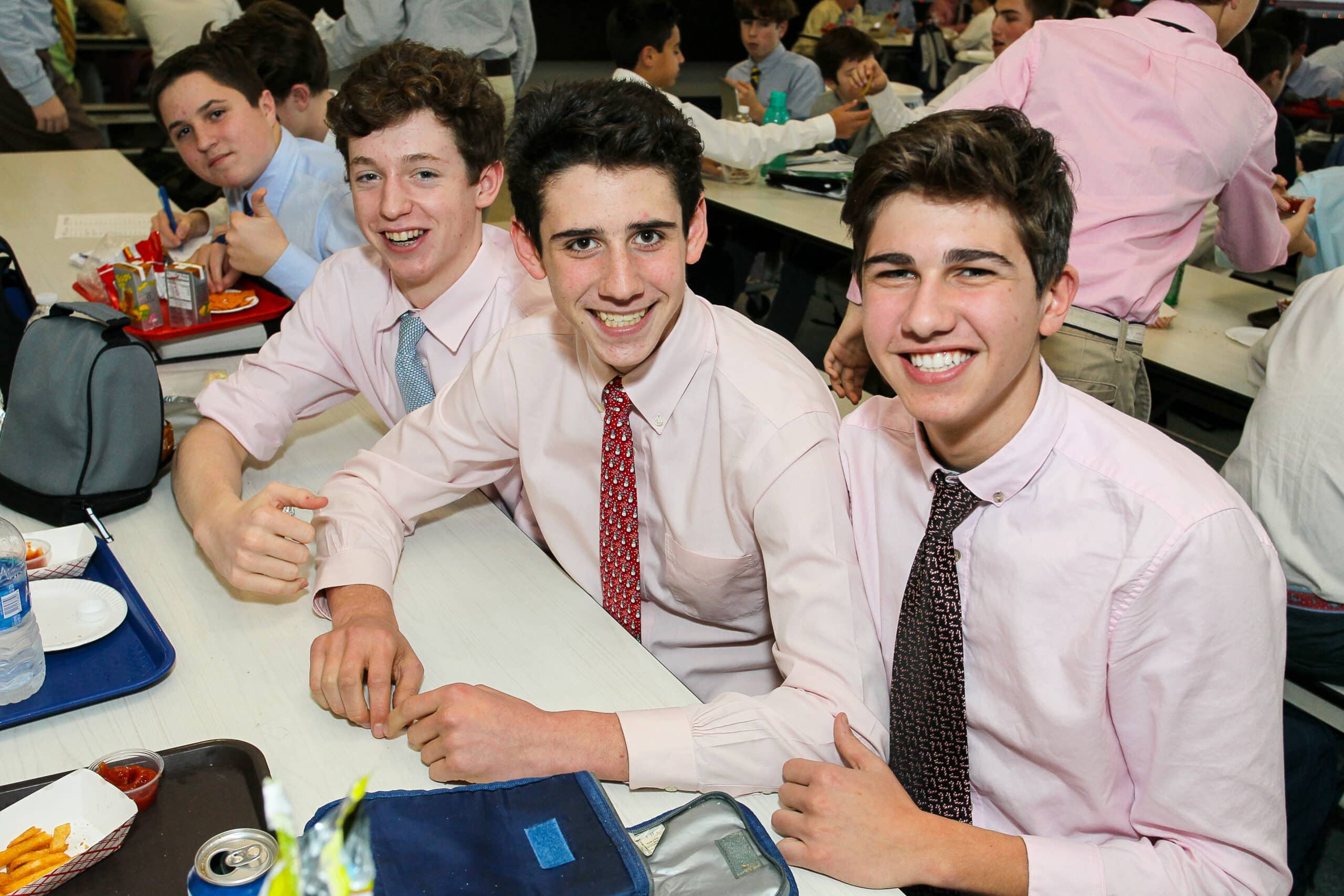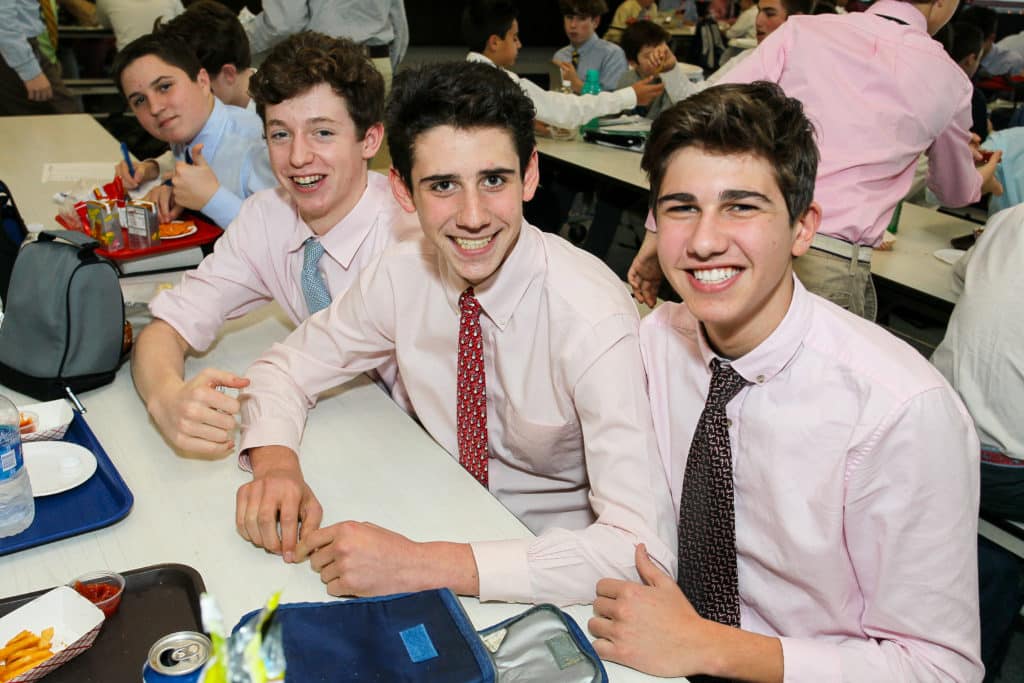
CBA Cafeteria Goes “Device Free” for 2018-19
December 6, 2018
 The use of technology at Christian Brothers Academy has undoubtedly been a positive addition to an already terrific educational experience. Students are able to visualize science experiments before they conduct their own, class notes are typed and digitized for effective studying down the line, and the Academy is able to offer expanded programming, graphic design and video courses.
The use of technology at Christian Brothers Academy has undoubtedly been a positive addition to an already terrific educational experience. Students are able to visualize science experiments before they conduct their own, class notes are typed and digitized for effective studying down the line, and the Academy is able to offer expanded programming, graphic design and video courses.
While technology will forever be a major component of a CBA education, there is one place that you will not find any computers, tablets or smartphones this school year: the cafeteria.
In September, the CBA administration announced the cafeteria was going “device free” for the first-time ever, with the idea that it would allow a brief reprieve from the constant technology that CBA students are experiencing every day.
“More and more research has been coming out about reducing screen time for adolescents,” Principal Ross Fales said. “That, combined with a grassroots movement from our faculty who were worried about the unproductive use of computers in the cafeteria, led us to consider and ultimately put into action this new device free zone.”
In recent years, students would be able to use their computers during their lunch period for school work, but also for playing video games, watching YouTube clips, or surfing the web. Unsurprisingly, this led to a reduction in interpersonal interactions between students in the cafeteria. It was the intent of the administrators to inject those vibrant conversations back into the lunch period with this device free idea.
“From the Lasallian side of things and the holistic education of CBA, we are trying to foster interpersonal relationships,” Dean of Students Matt Meehan said. “What I have noticed, and also have heard positively from students themselves, is that it is like these guys are back in elementary school, just chatting with their buddies. When you walk in the cafeteria now, it is totally engaging, rather than looking like a Starbucks where everyone is buried in their laptop.”
Associate Principal Sean Nunan, who helped develop the idea along with Director of Athletics Vito Chiaravalloti, made sure that the students knew they were not being “punished” by this new rule.
“This was never meant to be punitive in any way, but more of a positive development of our program here at CBA,” Nunan said. “We are forcing them to talk to each other, because by all means, they should be able to converse with their peers. They are going to form stronger bonds by speaking with each other.”
While students have begun to adapt to the new policy, there was understandably a transition period for the sophomores, juniors and seniors.
 “Coming back to CBA and getting used to the cafeteria being a device free zone was certainly an adjustment that we found difficult to make,” junior Aedan Moran said. “After some time, I definitely found myself having enjoyable conversations with my friends and not staring at a screen during my lunch period. This device free zone has started to grow on us and we see the many benefits that it can have on the student body.”
“Coming back to CBA and getting used to the cafeteria being a device free zone was certainly an adjustment that we found difficult to make,” junior Aedan Moran said. “After some time, I definitely found myself having enjoyable conversations with my friends and not staring at a screen during my lunch period. This device free zone has started to grow on us and we see the many benefits that it can have on the student body.”
Sophomore Blake Jaronko believes that the change is ultimately for the better, albeit the minor inconvenience.
“On a typical school day last year, everyone would eat their lunch and then go onto their computers to play games or listen to music,” Jaronko said. “Although it was hard to adjust at first, CBA’s new system was a positive change. In our generation, technology is a major component of our lives, but this year, it is clear that more time is spent interacting with friends while in the cafeteria.”
The cafeteria is device free throughout the entire school day, whether it is before school while breakfast is being served or during the six allotted lunch periods. While the cafeteria is now device free, that doesn’t mean students do not get the same opportunity to complete constructive work during their valuable free time. The Quinn Library & Media Center has become the rightful hub for computer use both in the morning hours and during the school day.
“We have to contrast this against the fact that its a technology driven world,” Fales said. “We have a bring your own device program now. We understand the necessity of technology in our lives. Computers and technology are tools in every class in some sort of way. Like any tool, there is a time and place for it, and it doesn’t have to be used all the time for every purpose.”
The administration also allows underclassmen students to obtain passes for the library to use during their lunch period, since those students do not have the same freedom privileges as upperclassmen. The students have to get the signed pass from a teacher, which has also promoted the skill of planning ahead in order to accomplish a task.
“In doing this, we are also setting up a situation where, in order for the students to get what they want, they do need to take the initiative,” Nunan said. “They need to express themselves clearly to a teacher to obtain the pass. That’s not a skill that will show up on the report card, but something that will benefit them throughout their school and professional lives.”
Administration and teachers alike made sure that the student body knew that they could still use their lunch periods as constructively as they wanted.
“We went to great lengths to make sure that students, who actually wanted to get work done, were still able to do that. Especially for underclassmen who do not have free periods, we didn’t want to take that opportunity away from them,” Meehan said.
For students, there was an obvious transition period in September, but as time as passed, the device free cafeteria has grown in popularity among students, faculty and administrators.
Since CBA opened in 1959, the cafeteria has always been considered one of the most dynamic places on campus. Now, it has seen a renaissance of both positivity and popularity.
“It’s very much like we have come full circle,” Fales said. “There was such a push over the past decade or so to get more technology into schools. Now, we are recognizing the moderation that the students need with these devices. Our cafeteria now hearkens back to the old days. The kids have to use interpersonal creativity to entertain themselves during their lunch period, which I think is a positive in all regards.”
